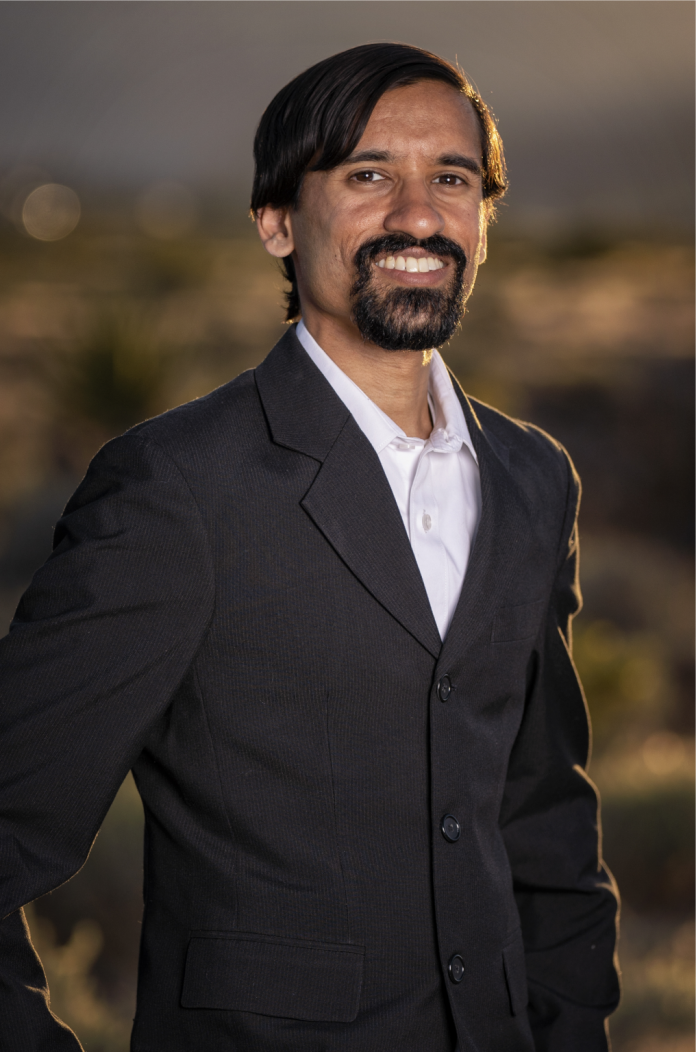Deepen Kothari is “Your Friend” running for Clark County Commissioner in District D (North Central Las Vegas).
What makes his campaign slogan real is that he travels in so many different circles in Las Vegas that you probably do already know him whether you realize it or not.
Former Clark County middle school teacher, small businessman, LGBTQ activist, transgender rights advocate and ski enthusiast, Mr. Kothari’s résumé is as diverse as his academic background—finance specialist, chemist, teacher, and lawyer. Which makes him uniquely qualified for election to one of the most powerful offices in the state of Nevada—Clark County Commissioner.
But his hoped-for route to office sounds more based in his Jain spirituality than in the pragmatism of Clark County power politics. His website’s “Contribute” button pops up this disclaimer, “Just kidding! I don’t need your money, just your vote.” Kothari’s “non-violent” approach to politics is based in friendship.
When I spoke with him about his campaign, he said, “My supporters are people who personally believe in my candidacy because of the difference I have made in their lives, because I have worked alongside them.” This support base includes former students, business contacts, and people who he has helped through his personal advocacy. He says he has 200 personal friends who are supporters of his campaign willing to knock on every door in District D, twice—if not for the coronavirus. Now these same friends are calling or texting every household in District D.
Kothari takes issue though when I label his candidacy “personalist.” He says his campaign is about the practical future of Clark County and Las Vegas in the era of the coronavirus. He says that there is no returning to business as normal but only to business as better.
Kothari is concrete and even ruthless in his pragmatism. “Some industries just are never coming back. We have to triage those businesses which can really benefit from our help.” He says, “Casinos will spring back on their own. They are already looking to Macao for their recovery model.” Kothari says that restaurants and small businesses are the ones that can most benefit from government help.
He points out that the CARES Act is not intended to make up for lost business revenues but to assist businesses to grow into the future, so he envisions two targeted infrastructure projects that will significantly impact the Las Vegas economy.
Free WiFi for all. It hits like a dud. Like some socialist computer gaming nerd’s idea of a worker’s paradise. Until Kothari points out the reality of the game on the ground. After the coronavirus, online education will no longer be an option but a necessity. It is up to the Clark County School District to ensure each student has a Chrome Notebook, but the County can provide countywide access to the Internet through free WiFi.
In addition, Kothari points out that universally accessible WiFi supports a second emerging reality in our coronavirus world, the advance of telemedicine into the medical mainstream. Telemedicine technology has existed for twenty years, but government red-tape prevented its widespread adoption even in states like Nevada where our rural communities lack ready access to in-person health services.
That all changed when even people in Las Vegas could not access in-person health care because of social distancing restrictions. Now Medicare and Medicaid are covering telemedicine services. The long dreamt of vision of Las Vegas as a hot spot of medical tourism is about to become a reality, only now Las Vegas will be the center of an emerging telehealth medicine boom.
In one of his campaign’s social media spots, Kothari invited Republicans to change their party affiliation so that they can vote for him in the primary. His approach to social justice issues make that appeal more than just a pipe dream.
Kothari says, “Smart investment is the answer to problems like homelessness. Throwing money at a problem is not a solution. The problem is the underlying culture. Do something different to lead to better results.”
He says, “Homelessness can better be addressed by non-government groups who are living the issue, like veterans’ groups. Veterans understand PTSD, mental health issues and substance use among their own. LGBTQ groups understand homeless LGBTQ youth who have run away or been kicked out of non-accepting families. Faith communities understand the spiritually hungry.”
Kothari said, “Clark County must partner with non-profits by expanding Outside Agency Grants to empower them to do the work. They know better than the County how to stretch taxpayer dollars to maximize their effectiveness.”
No one group can do it all, Kothari says, but together they can form effective partnerships to accomplish change.
Kothari is out as a pansexual man, but he is not running as an LGBTQ candidate. He says LGBTQ issues take on a broader aspect in the context of the economic restart, health care and education. Likewise, when I ask about specific issues that he might want to address in District D, Kothari responded, “The issues that are prevalent in District D, like child poverty, food insecurity, are not unique to my district but impact all of Clark County.”
The 37-year old bachelor moved to Las Vegas 10 years ago after giving up a high paying law firm job in San Francisco for a job as a middle school teacher with Teach for America. Kothari measures his success as a teacher by the success of his students and he quickly starts bragging about their scores on standardized tests. “My kids outperformed the accelerated skills,” he said.
How did he do it? With pencils. He made it clear that he expected his students to come to his classes equipped with pencils and notebooks and ready to learn. This set the tone for his high academic expectations which his students met or exceeded.
A coronavirus lesson Kothari learned as a businessman–the advantage of going online—he has brought to the social programming he does for LGBTQ+ adults. For Las Vegas PRIDE, where he had been offering traditional in-person classes, Kothari discovered that being forced to go online enabled him to tailor his product to the needs of individuals. Kothari says that as a middle school teacher he has had as many as 45 students in a class. Online classes have an infinite capacity and can utilize teaching teams of multiple teachers to address multiple learning needs and so tailor the online learning experience to each individual child.
Kothari said his intellectual curiosity brought him into the law when he was a Ph.D candidate in chemistry. “I wanted to know everything rather than becoming specialized.”
Kothari’s father and mother emigrated to the United States from India in the 70s and he had the opportunity to live and work in India, which explains his passion for skiing and snowboarding. One year to encourage his middle school students to improve their grades he offered financial incentives towards a class ski trip. Every student attained a high enough grade to earn the incentive to pay for the trip. His favorite sports team–the Las Vegas Golden Knights, of course.




























